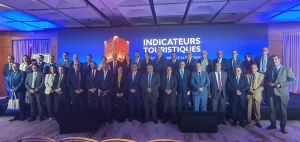The fusion of tourism and aviation holds the key to transforming global travel, a synergy that industry leaders are increasingly prioritizing. At the forefront of this movement is Gavin Eccles, Consulting Partner for Airline Pros International, who shared crucial insights during this year’s AviaDev conference in Namibia. His focus was on the urgent need to bridge the gap between tourism boards and the aviation industry, a necessary alignment to enhance route development and destination marketing and usher in a new era of collaboration.
Speaking to VoyagesAfriq on the sidelines at AviaDev, Eccles highlighted a critical shift: “the traditional siloed approach, where tourism boards, airports, and airlines operate independently, is outdated. In today’s competitive landscape, these stakeholders must work together, creating compelling business cases that attract airlines to new destinations. By leveraging airport data and tourism insights, this collaborative approach can drive significant growth”.
He further opined, “Tourism boards should not be mere observers but active participants in shaping the future of air travel. By partnering closely with airports and airlines, they can ensure that destination marketing strategies align with the strategic goals of the aviation industry, leading to mutual success”.

As the aviation industry evolves, so too must the approach to tourism. Eccles proposed the formation of Air Service Organizations (ASOs)—collaborative entities that unite representatives from airports, tourism boards, hotel associations, and convention bureaus. This model fosters a shared vision and clear roles, driving innovation and progress across the board.
He stated that, “Aligning marketing strategies with airline objectives is not just about promoting destinations; it’s about making them accessible and appealing to travelers”. This alignment can unlock significant potential, helping tourism boards capitalize on opportunities that support both route development and tourism growth.
At AviaDev, Eccles also led a workshop focused on the crucial role tourism boards often referred to as Destination Management Organizations (DMOs) play in route development. Traditionally, these discussions have been dominated by airports and airlines, leaving tourism boards on the sidelines. However, tourism boards offer valuable insights into market demand and destination appeal, which are essential for building a strong business case for airlines.
He further stated, “The goal is not to turn tourism boards into aviation experts, but to enhance their strategic thinking around where and how to allocate marketing budgets. By scaling up their teams and adapting their approaches, they can not only market their destinations effectively, but also ensure that these destinations are easily accessible to travelers”.
One of the most notable changes in the aviation industry is the shift from long-term planning to more flexible, short-term opportunities. This evolution presents a unique chance for tourism boards to align their marketing efforts with the strategic goals of airlines, ensuring both sectors work towards shared success in order to create demand that directly supports route development, driving growth in tourism while benefiting the aviation industry.
Eccles also emphasized the importance of marketing through airlines, noting that these partnerships not only promote destinations but also simplify the travel process for potential visitors. This strategic alignment is key to unlocking new potential, enabling tourism boards to drive growth and innovate.
The 2025 AviaDev conference is scheduled to take place in Zanzibar, Tanzania from 11-13 June








